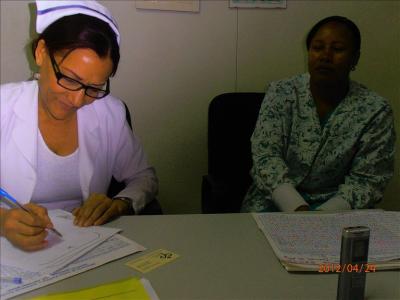A health-system that responds adequately to health conditions associated with gender inequality is a system that has the capacity to address gender norms, roles and relations through policies, programs, and health services (WHO 2011). Cultural Practice, LLC (CP) works with donors and their implementing partners to respond effectively to gender inequalities that are determinants of poor health outcomes, and to increase women’s and men’s active participation in healthcare planning and oversight. CP has guided this effort through the development of gender analysis, evaluation, and research, strategy development, and gender integrated health program design tools.
Evaluation, Research, and Strategy Design
CP has helped major foundations, universities, and NGOs in developing gender strategies and evaluations for their health programs. It was a primary subcontractor responsible for gender training and policy analysis development under the Health Policy Initiative IQC. It has responded to Bureau of Global Health and missions requests for these tasks and other research and evaluations. CP has also completed health strategies for CARE and other NGOs and for USAID in Bolivia, Indonesia (both with team partner QED LLC), and Nigeria). CP was the principal architect of CARE’s worldwide Mother’s Matter Strategy for reducing maternal and neonatal mortality. CP also led two major worldwide evaluations of projections designed to reduce maternal mortality, the Averting Maternal Death and Disability (AMDD) Project implemented by Columbia University’s Mailman School of Public Health in 52 countries and the Initiative for Maternal Mortality Program Assessment (IMMPACT) designed to develop more rapid and reliable maternal mortality measurement tools.
More recently, in collaboration with Abt Associates and USAID/Dominican Republic, CP under took a study to address the question ‘Is it possible to significantly reduce maternal and neonatal morbidity-mortality if the major factors associated with these health problems are identified, and an action plan with the active participation of staff and community is developed and implemented.’ With the application of the Most Significant Change Methodology, CP found that after years of the answer being no in the Dominican Republic, it was a very resounding yes, mostly due to Abt Associates’ innovative change management approach. The most significant change that had occurred to change the trajectory of maternal mortality in the Dominican Republic was that healthcare providers and administrators had put women and their newborns at the center of care, elevating the concerns of their clients above their own personal and institutional needs, interests, and concerns. Not only was this good for the health of their clients, it also made for a more pleasant and collaborative workplace.
In collaboration with EngenderHealth, CP conducted the first evaluation for USAID of the integration of family planning and fistula surgical repair services. This evaluation revealed that the belief that post-operative fistula clients would not be interested in family planning was unfounded. Through a combination of quantitative analysis of monitoring data from 10 country programs, and focus groups with fistula clients in Nigeria, the evaluation demonstrated that there is both high demand for and uptake of family planning by women who have undergone surgery after experiencing the tragedy of fistula. The evaluation also pointed to an effective process for integrating different types of head services.

During 2013, CP worked with Abt Associates and the President’s Malaria Initiative (PMI) to AIRS IRS to conduct program-level gender analysis with a particular focus on equal opportunities for women and men on the Indoor Residual Spray (IRS) teams. IRS is the application of insecticide to the inside of dwellings, on walls and other surfaces that serve as a resting place for malaria-infected mosquitoes. CP examined the types of constraints women face in accessing employment through the project, which in many countries is an important source of seasonal income. CP was able to point to changes that PMI, host governments, and their implementing organization can make in their personnel and recruitment policies to open up more equal opportunities for men and women to participate in the yearly campaigns.
Gender Analysis and Integration Tools for Health
In 2009, CP along with Population Reference Bureau developed A Manual for Integrating Gender into Reproductive Health and HIV Programs for the USAID sponsored Interagency Gender Working Group. With increased demand for guidance on how to conduct the gender analysis required for USAID project, many organizations working in health voiced the need for more specific guidance on how to collect and analyze gender-focus data. In response to this need, CP working with Jhpiego to develop a gender analysis toolkit with data collection guidelines tailored to different areas of health including, HIV/AIDS, reproductive health and family planning (RH/FP), maternal, neonatal, and child health (MNCH), malaria, and nutrition. The tool also provides a collection of annotated resources for gender-focused data collection and analysis for health programming.
Over a period of nine months, CP undertook a similar activity for the Bill and Melinda Gates Foundation’s MNCH, RH/FP, and Nutrition Teams. With insights from extensive literature and portfolio reviews, CP developed a primer for program officers to guide their grantees on gender integration in the design, implementation, and monitoring of their programs.
Each organization that CP works with has different needs, strengths and weaknesses. By understanding the client, carefully defining the problems and questions, and working in a highly collaborative manner with different stakeholders, CP helps organizations reach their health and gender equality goals.







